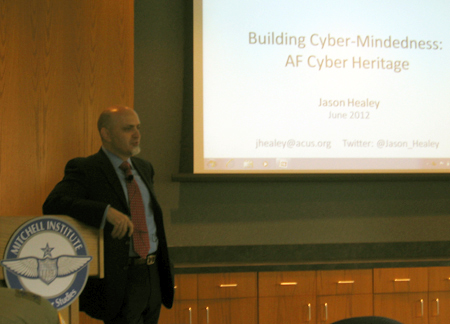Jason Healey,  director of the Atlantic Council’s cyber statecraft initiative, said the Air Force must be both air- and cyber-minded. “We learn heritage to understand the future, but we ignore this when it comes to cyber,” said Healey during a June 22 address in Arlington, Va., sponsored by AFA’s Mitchell Institute for Airpower Studies. He added: “I’m not sure why.” Healey recounted what he said was the first US case of cyber espionage and the Air Force’s critical role in halting the theft. It was in 1986, when an astrophysicist-turned-system-administrator discovered an unauthorized user on a laboratory computer system. Air Force special agent Jim Christie traced the hacker to Germany. The hacker was selling secrets to the KGB. Still, most airmen haven’t heard the tale, said Healey. He also called on the Air Force to stop referring to cyberspace as a new domain. Myths that cyber attacks are lightning-fast and strategically cataclysmic still abound in the force, making the attacks hard to systematically address, he noted. Back in March, Healey spoke at AFA’s CyberFutures Conference. For that coverage, see: Cyber History Ignored and Beyond Government Defending Itself.
director of the Atlantic Council’s cyber statecraft initiative, said the Air Force must be both air- and cyber-minded. “We learn heritage to understand the future, but we ignore this when it comes to cyber,” said Healey during a June 22 address in Arlington, Va., sponsored by AFA’s Mitchell Institute for Airpower Studies. He added: “I’m not sure why.” Healey recounted what he said was the first US case of cyber espionage and the Air Force’s critical role in halting the theft. It was in 1986, when an astrophysicist-turned-system-administrator discovered an unauthorized user on a laboratory computer system. Air Force special agent Jim Christie traced the hacker to Germany. The hacker was selling secrets to the KGB. Still, most airmen haven’t heard the tale, said Healey. He also called on the Air Force to stop referring to cyberspace as a new domain. Myths that cyber attacks are lightning-fast and strategically cataclysmic still abound in the force, making the attacks hard to systematically address, he noted. Back in March, Healey spoke at AFA’s CyberFutures Conference. For that coverage, see: Cyber History Ignored and Beyond Government Defending Itself.
As with previous stealth aircraft unveilings, the Air Force’s imagery of the F-47 Next-Generation Air Dominance fighter has been doctored to keep adversaries guessing about its true shaping and design philosophy.